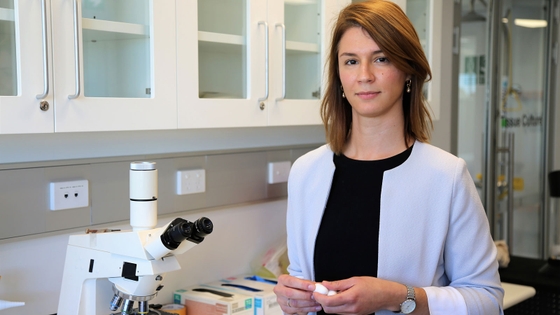G protein-coupled receptor context-specific biased agonism to treat heart disease
/
G protein-coupled receptor context-specific biased agonism to treat heart disease
Dr Lauren May, Monash University
2017 Future Leader Fellowship
Years funded: 2018-2024
Heart attack and secondary heart failure remain significant health burdens.
Stimulation of adenosine G protein-coupled receptors (ARs) located on heart cells confers potent cardio protection, improving acute and longer-term heart function following a heart attack.
Unfortunately, the transition of AR drugs into the clinic has thus far failed due to:
- a lack of on-target potency due to suboptimal preclinical mechanistic studies, or
- dose-limiting on-target adverse effects due to recruitment of undesired signalling.
Dr Lauren May’s research is focused on developing a new class of drugs, AR biased agonists, that avoid on-target adverse effects by selectively stimulating desired signalling while minimising activation of undesirable signalling.
The aim is to better understand the mechanism of action of these types of drugs and establish their clinical potential for treating heart attack and secondary heart failure, particularly in elderly and diabetic patients who have both an increased risk of heart attack and worse clinical recovery following a heart attack.
Dr May’s research program involves 3 inter-related themes that use field-leading approaches to address fundamental knowledge gaps and challenges associated with AR biased agonism.
THEME 1: Identification the distinct patterns of drug-receptor and receptor-effector interactions that govern AR bias.
THEME 2: Elucidation of the influence of disease, ageing and diabetes on the nature of AR biased agonism observed in cardiac cells.
THEME 3: Investigation of the longer-term therapeutic efficacy of AR biased agonists to inhibit the progression of heart failure following a heart attack in old and diabetic rats.
OUTCOMES: Our findings will yield fundamental breakthroughs in the understanding of a therapeutically important, but suboptimally targeted receptor. Outcomes, have the potential to revolutionise academic and commercial drug discovery efforts
You might also be interested in...

Heart Foundation Research Alumni
The Heart Foundation Alumni will collectively make a positive impact on the cardiovascular health of Australians.

Research funding portfolio
Understand the application process and requirements of our various funding programs.

Genomic prevention of coronary heart disease in Australia
Associate Professor Paul Lacaze, Monash University - 2023 Future Leader Fellowship - Level 3 (Honorary)
Last updated12 March 2024